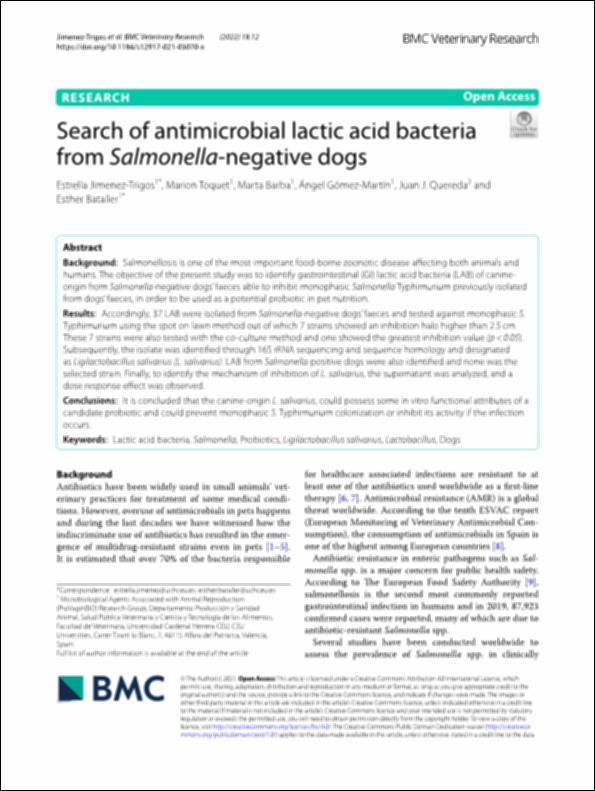Por favor, use este identificador para citar o enlazar este ítem:
http://hdl.handle.net/10637/14374Search of antimicrobial lactic acid bacteria from "Salmonella"-negative dogs
| Título : | Search of antimicrobial lactic acid bacteria from "Salmonella"-negative dogs |
| Autor : | Jiménez Trigos, María Estrella Toquet, Marion Barba Recreo, Marta Gómez Martín, Ángel Quereda Torres, Juan José Bataller Leiva, Esther |
| Materias: | Dogs - Communicable diseases.; Zoonosis.; Salmonellosis in animals.; Salmonelosis en los animales.; Perros - Enfermedades infecciosas.; Probiotics.; Ácido láctico.; Lactic acid.; Lactobacilos.; Lactobacillus.; Probióticos.; Zoonoses. |
| Editorial : | Springer Nature |
| Citación : | Jimenez-Trigos, E., Toquet, M., Barba, M., Gómez-Martín, Á., Quereda, J. J. & Bataller, E. (2022). Search of antimicrobial lactic acid bacteria from "Salmonella"-negative dogs. BMC Veterinary Research, vol. 18, i. 1 (03 jan.), art. 12. DOI: https://doi.org/10.1186/s12917-021-03070-x |
| Resumen : | Background: Salmonellosis is one of the most important food-borne zoonotic disease affecting both animals and humans. The objective of the present study was to identify gastrointestinal (GI) lactic acid bacteria (LAB) of canineorigin from Salmonella-negative dogs’ faeces able to inhibit monophasic Salmonella Typhimurium previously isolated from dogs’ faeces, in order to be used as a potential probiotic in pet nutrition. Results: Accordingly, 37 LAB were isolated from Salmonella-negative dogs’ faeces and tested against monophasic S. Typhimurium using the spot on lawn method out of which 7 strains showed an inhibition halo higher than 2.5 cm. These 7 strains were also tested with the co-culture method and one showed the greatest inhibition value (p < 0.05). Subsequently, the isolate was identified through 16S rRNA sequencing and sequence homology and designated as Ligilactobacillus salivarius (L. salivarius). LAB from Salmonella-positive dogs were also identified and none was the selected strain. Finally, to identify the mechanism of inhibition of L. salivarius, the supernatant was analyzed, and a dose response effect was observed. Conclusions: It is concluded that the canine-origin L. salivarius, could possess some in vitro functional attributes of a candidate probiotic and could prevent monophasic S. Typhimurium colonization or inhibit its activity if the infection occurs. |
| Descripción : | Este artículo se encuentra disponible en la siguiente URL: https://bmcvetres.biomedcentral.com/articles/10.1186/s12917-021-03070-x |
| URI : | http://hdl.handle.net/10637/14374 |
| Derechos: | http://creativecommons.org/licenses/by/4.0/deed.es |
| ISSN : | 1746-6148 (Electrónico) |
| Idioma: | es |
| Fecha de publicación : | 3-ene-2022 |
| Centro : | Universidad Cardenal Herrera-CEU |
| Aparece en las colecciones: | Dpto. Producción y Sanidad Animal, Salud Pública Veterinaria y Ciencia y Tecnología de los Alimentos |
Los ítems de DSpace están protegidos por copyright, con todos los derechos reservados, a menos que se indique lo contrario.


